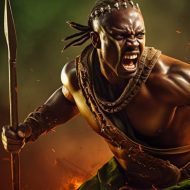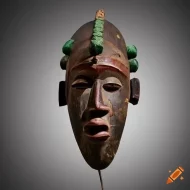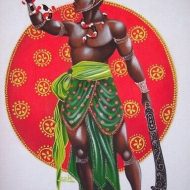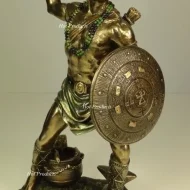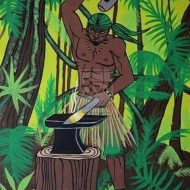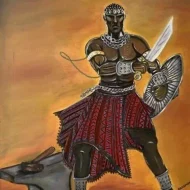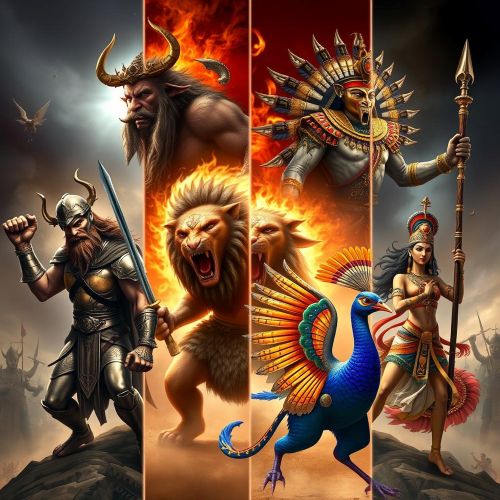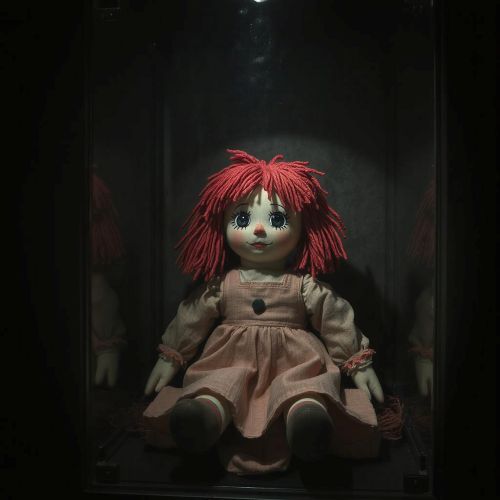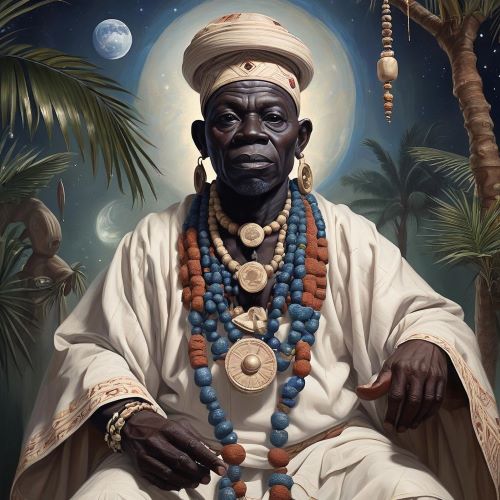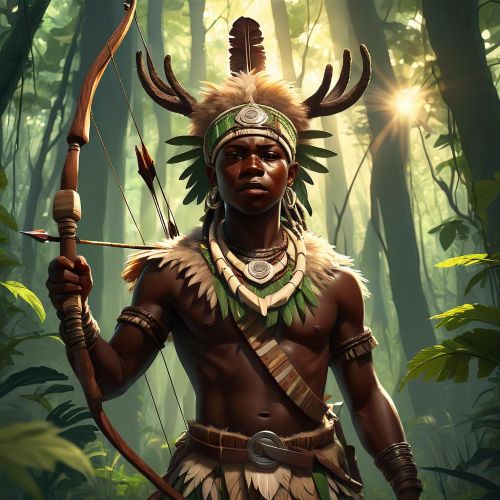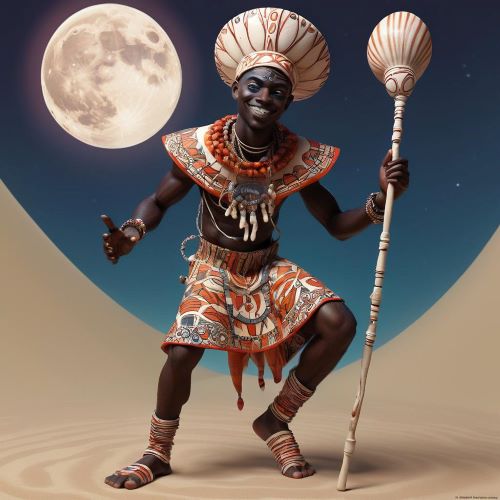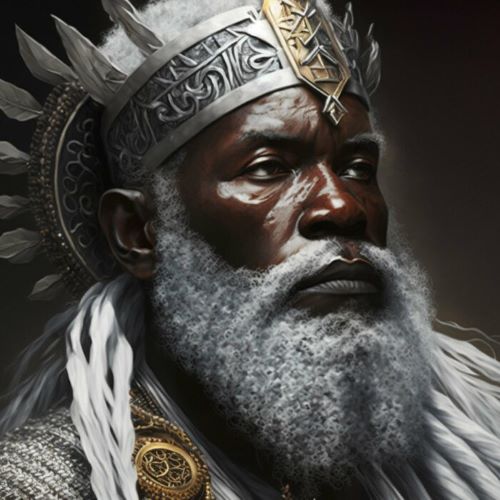Ogoun : The Blacksmith God
Listen
At a glance
| Description | |
|---|---|
| Origin | African Mythology |
| Classification | Gods |
| Family Members | Oduduwa (Father), Shango (Brother), Orunmila (Sister) |
| Region | West Africa |
| Associated With | Metalworking, Blacksmiths, Weapons |
Ogun
Introduction
Ogun, alternatively recognized as Ogoun or Ogum, holds a significant position in Yoruba mythology. He is esteemed as the deity of metalworking, artisans, and warfare. Ogun is characterized by his fierce and protective disposition, and his volatile temper can unleash chaos when provoked. He is a revered figure in Yoruba culture, embodying the domains of iron, warfare, and labor. His profound influence extends across diverse facets of Yoruba heritage, spanning metallurgy to martial traditions, and his enduring legend continues to mold beliefs and customs in contemporary Nigeria and beyond.
Physical Traits
Ogun’s physical attributes find representation in a variety of symbolic elements. Iron, the dog, and the palm frond stand out as the primary symbols associated with Ogun, each conveying distinct aspects of his character. Iron, in particular, serves as the foremost emblem of Ogun, signifying his profound expertise in metalwork and transformation. Typically portrayed as a robust and muscular figure, Ogun is frequently depicted wielding a machete in one hand and grasping a hammer or an anvil in the other. This distinctive portrayal serves as a visual testament to his mastery over the realm of iron and the forge. Donning traditional Yoruba attire, Ogun exudes an unmistakable aura of strength and authority, underscoring his role as both a formidable warrior and protector.
Family
In the realm of Yoruba mythology, Ogun once sought to claim the throne following the passing of Obatala, who ruled twice, both prior to and after Oduduwa. However, his ambitions were thwarted by Obamakin (Obalufon Ogbogbodirin). Within the extensive pantheon of Yoruba deities, Ogun holds a prominent position as the offspring of Oduduwa, the esteemed forebearer of the Yoruba populace. Furthermore, he is recognized as a sibling to other significant deities, including Shango, the god presiding over thunder and lightning, and Orunmila, the divine figure associated with wisdom and divination. This intricate web of familial connections deeply intertwines the destinies of these formidable deities, thereby shaping the collective consciousness of the Yoruba people.
Other names
Ogun’s name is subject to variation across different cultures and regions, reflecting the diversity of African religions where he is venerated. In various traditions such as Yoruba religion, Edo religion, Dahomey mythology, Vodun, Santería, Umbanda, Candomblé, Quimbanda, Haitian Vodou, Louisiana Voodoo, and Folk Catholicism, Ogun is recognized by names like Oggun, Ogou, Ògún, Gou, and Ogúm. In Yoruba mythology, the multitude of names assigned to Ogun underscore the diverse facets of his character and influence.
Among them, he is known as “Ogun Onire” – the proprietor of the town of Ire, “Ogun Alagbede” – the leader of the blacksmiths, and “Ogun Alara” – the deity responsible for path-clearing, among others. These various names serve to emphasize his multifaceted nature and underline his roles as a craftsman, warrior, and the patron deity of numerous professions.
Powers and Abilities
Ogun is held in high esteem for his formidable array of powers and abilities. As the god of iron, he is credited with bestowing upon humans the invaluable gift of iron, along with the knowledge of forging and metalwork. He is also venerated as the deity overseeing warfare, warriors, and truth. In certain traditions, it is believed that Ogun played a pivotal role in paving the way for the other orisha to descend to Earth, utilizing a metal axe, and assisted by a faithful dog.
Ogun’s mastery of iron and metalwork takes center stage in his mythology. He is lauded as the patron deity of blacksmiths, artisans, and all who engage in the manipulation of metals. It is widely believed that Ogun possesses unparalleled expertise in the intricate art of forging, enabling him to shape even the most resilient materials with unparalleled precision and finesse. This extraordinary skill is mirrored in his status as a formidable warrior, brandishing his machete with unmatched prowess on the battlefield.
Furthermore, Ogun’s reverence extends to his role as a deity associated with the removal of obstacles and the clearing of paths. This facet of his persona holds particular significance in the agricultural sphere, emphasizing his pivotal role in facilitating the growth and prosperity of crops.
Modern Day Influence
In the present day, Ogun’s influence transcends the realm of mythology and finds a tangible presence in everyday life. He holds the esteemed status of the traditional deity among warriors, hunters, blacksmiths, technologists, and drivers within the Yoruba region. Devotees of the traditional Yoruba religion demonstrate their commitment to honesty in court by invoking Ogun’s name while “kissing a piece of iron”. Moreover, drivers carry an amulet of Ogun as a protective charm, believed to ward off the specter of traffic accidents.
Ogun’s legacy is also manifest in various cultural customs and festive traditions. His veneration is notably observed in Ogun, Ekiti, Oyo, and Ondo States. Among his followers, there is a belief that Ogun has “wo ile sun,” signifying his disappearance beneath the earth’s surface rather than conventional mortality. This belief forms the foundational core of the Olojo Festival.
In conclusion, Ogun’s influence in Yoruba mythology transcends its ancient origins and extends into the fabric of contemporary life, shaping not only religious beliefs and practices but also societal norms and behaviors. His legacy continues to thrive in the modern era, emphasizing the enduring significance of these age-old deities.
Related Images
Frequently Asked Questions
What is lorem Ipsum?
I am text block. Click edit button to change this text. Lorem ipsum dolor sit amet, consectetur adipiscing elit. Ut elit tellus, luctus nec ullamcorper mattis, pulvinar dapibus leo.
What is lorem Ipsum?
I am text block. Click edit button to change this text. Lorem ipsum dolor sit amet, consectetur adipiscing elit. Ut elit tellus, luctus nec ullamcorper mattis, pulvinar dapibus leo.
What is lorem Ipsum?
I am text block. Click edit button to change this text. Lorem ipsum dolor sit amet, consectetur adipiscing elit. Ut elit tellus, luctus nec ullamcorper mattis, pulvinar dapibus leo.
What is lorem Ipsum?
I am text block. Click edit button to change this text. Lorem ipsum dolor sit amet, consectetur adipiscing elit. Ut elit tellus, luctus nec ullamcorper mattis, pulvinar dapibus leo.
What is lorem Ipsum?
I am text block. Click edit button to change this text. Lorem ipsum dolor sit amet, consectetur adipiscing elit. Ut elit tellus, luctus nec ullamcorper mattis, pulvinar dapibus leo.

